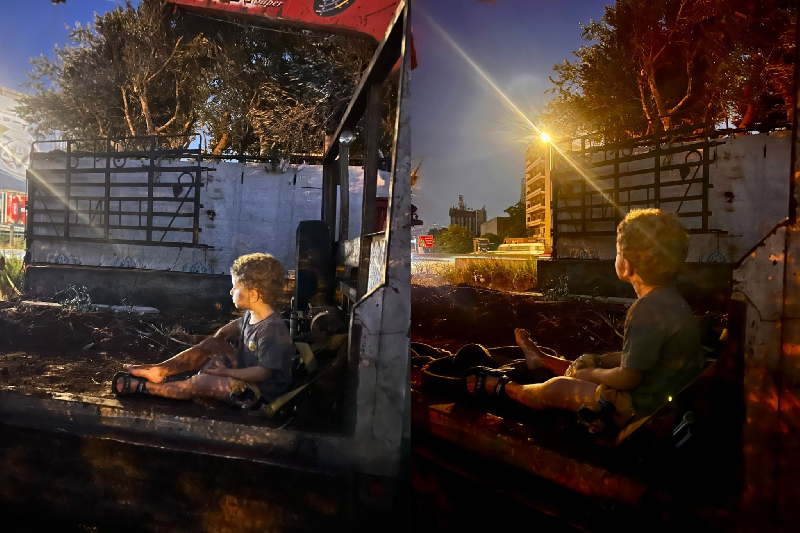Five years after the Beirut port explosion, a group of victims’ families launched a powerful memorial initiative: planting one olive tree for each life lost, between the Emigrant’s Statue and the shattered silos. A peaceful and persistent gesture in a place where justice has failed to deliver.
When justice falters, memory remains. A memory planted with bare hands into a soil still shaken by anger and silence. For five years, families of August 4, 2020 explosion victims have waited in vain, expecting answers, accountability, and convictions. But waiting led nowhere. So, some have stopped waiting. Not out of vengeance, but to stand their ground.
In this institutional void, a unique project has taken shape: one olive tree per victim, planted between the Emigrant’s Statue and the broken silos of Beirut’s port. At the foot of each tree, a white marble plaque will bear the name of a life taken. A garden, yes, but also a statement. A space of peace to resist abandonment. A place of remembrance, so that grief no longer wanders.
A moving photo of a young boy sitting in a truck, likely with his father who came to deliver olive trees, struck a chord. It was night. A single light illuminated his silhouette against the darkness in a country where people often live without power. That fleeting, dreamlike scene became a kind of postcard from a Lebanon suspended between innocence and mourning, lit up for the brief span of a fragile hope.

“This is the fate of Lebanon’s youth... either emigrate or be killed...” © This is Beirut
Dr. Nazih Adem, father of Krystel, one of the victims, remembers telling the boy as he pointed to the site: “This is the fate of Lebanon’s youth... either emigrate or be killed, if our politicians keep running the country this way.” That sentence, spoken between the Emigrant’s Statue and the crumbling silos, crystallized the idea of an open-air memorial.
A Garden for Remembrance
The project, driven by committed figures like Dr. Adem, Wissam Diab (who first proposed the idea), and lawyer Cécile Roukoz (whose sister was also among the victims), was initiated a few weeks ago. An official request was submitted to Beirut’s Mohafez, who approved the plantings in accordance with legal guidelines. The municipality, however, remained absent from the process, just as it has been, according to several families, since the day of the disaster.
Among the roughly 240 victims, 79 families have already joined the project. A modest number, but a strong beginning. Dr. Adem is clear: “We’re not pressuring anyone. There’s no obligation to take part.” Several factors explain the absences: some victims were foreigners with no relatives in Lebanon; others left behind very young children, now orphans, with no adults to answer the call. Some families face financial hardship; others choose to grieve in private or simply aren’t ready.
“We offered to cover the costs for those unable to pay,” adds Dr. Adem. “But we can’t force anyone. Everyone processes pain in their own way.”
While the original idea came from Wissam Diab, the project quickly evolved through dialogue among the families. The chosen site, between two symbols of Lebanese history, departure and disaster, seemed to impose itself. “This space lies between the two fates we’ve been offered for years: emigration or death,” says Dr. Adem. “We wanted to create a third option: a space for peace.”

The chosen site, between two symbols of Lebanese history, departure and disaster, seemed to impose itself. © This is Beirut
This garden is not just a tribute. It is a refusal. Refusal of silence, chaos, and oblivion. “We plan to install benches, so people can sit, pray and reflect. It mustn’t become yet another abandoned or neglected site like so many others in Lebanon. We’ll insist that the authorities preserve it and respect it.”
The initiative is part of a broader movement of “active memory.” In several towns, families have already created memorials for their loved ones. In Daroun-Harissa, Dr. Adem built a commemorative site for his daughter Krystel on family land. It’s now part of a hiking trail for youth, where passersby stop to reflect in front of Krystel’s smiling portrait: “a young Lebanese woman who wanted to live in her country and share her many talents.”
Other families followed suit: in Kartaba, a memorial honors local firefighters killed that day; in Ashrafieh, a narrow street near Orthodox hospital bears the names of victims carved in stone. Everywhere, a shared will: to refuse erasure.
For many, what happened was not simply an accident. Dr. Adem calls it a crime. “Who committed it? That’s not for me to say…”
On Sunday evening, a symbolic blessing of the first trees will be held. The Apostolic Nuncio is expected, as well as the Prime Minister, the Minister of Interior, and Beirut’s governor. On that occasion, the inauguration of a new street, “August 4 Victims’ Street” will also be announced. It will link the Emigrant’s Statue to the port, the very place where everything changed.
And perhaps, in the heart of chaos, a little peace will grow. May the memory of each victim take root in this soil, as a final refusal to be forgotten.

No it isn’t the Bekaa, it is the Port of Beirut. © This is Beirut
The Olive Tree: For Memory and Peace
The olive tree is a symbol of peace across all Mediterranean cultures; it also stands for endurance, resilience, and wisdom. Its silvery leaves withstand drought. Its roots anchor deep. Some trees live for centuries. In biblical, Quranic, and classical texts, the olive tree embodies reconciliation, justice, and light.
To plant an olive tree in a victim’s name is to reject erasure and affirm a memory that endures through time. It is also to counter the violence of the blast with a quiet, patient act of renewal. This choice is not accidental; it is a symbolic answer to the abandonment of the living and a lasting tribute to the dead.




Comments